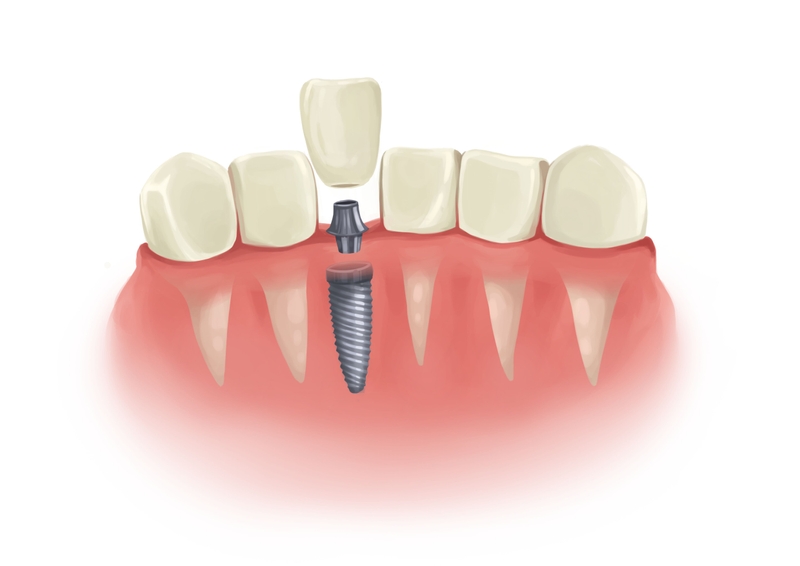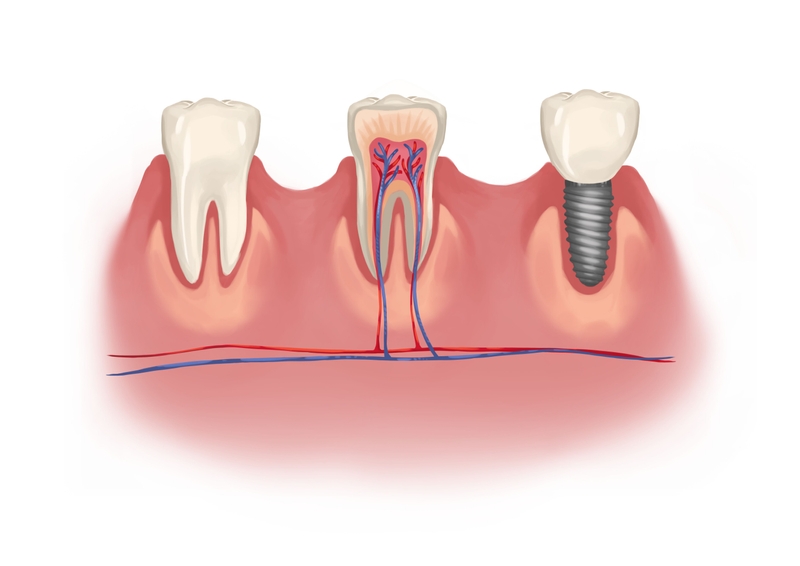- Traditional dental implants have a 98% success rate and can last a lifetime. Mini implants also have this potential, but they are more prone to failure if bone resorption continues.
- The patient's health and oral hygiene significantly impact the longevity of dental implants.
- If an implant crown breaks, you should replace it as soon as possible. You may need to remove your implant if you have a dental infection or bone loss.
The future of your smile is a decision away. Use Authority Dental to find the best quality dental implant services. It's easy, fast, and reliable.
Will you need to replace your dental implant in the future? Here's everything you need to know.
Dental implant lifespan

Picture by Authority Dental under CC 2.0 license
There are several types of dental implants, but the most common are the traditional implant and the mini implant. The life expectancy for each is different.
Traditional dental implants can last a lifetime. Once the implant has been integrated into the bone through a process called osseointegration, the risk of failure is very low. In fact, they have a 98% success rate.
Mini implants can last just as long as traditional ones if they are correctly cared for. The difference is that mini implants are often used when there is not enough bone to support a traditional implant. If the bone continues to resorb, the mini-implant may fail.
Harry Lee, DMD, provides a detailed explanation: "When patients ask me how long an implant lasts, I first have to clarify which part they are referring to. The dental implant itself—the titanium screw in your jaw—is designed to last a lifetime. It fuses with your bone and becomes a permanent, stable part of your anatomy. I often compare it to a brand-new foundation poured for a house. It is robust and durable."
"The part that is not designed to last forever is the crown, the white tooth part that sits on top. That is the 'roof' of the house. Just like a real roof, it takes a lot of wear and tear from chewing and will eventually need to be replaced, usually after 15 or 20 years," he emphasizes.
"That is a simple, non-surgical swap. The only thing that causes the foundation (the implant) to fail is erosion of the ground around it. This is a disease called peri-implantitis," Lee adds.
What factors affect dental implant longevity
One of the most significant factors in the longevity of a dental implant is the patient. Personal health conditions and oral habits are significant in determining the success of an implant.
Implant components quality
The abutment and crown connect to the implant. To help ensure success, these components should not be placed too soon after the implant surgery. “Loading” the implant before it has integrated with the bone will cause micromovements, leading to mobility.
The crown must be fabricated so as not to place additional pressure on the implant. Your dental provider must check the bite and ensure all teeth are evenly contacting. Too much force on just the implant will cause it to fail.
Low bone density
As we mentioned earlier, a low bone density can lead to implant failure. Implants should only be placed when there is adequate bone to support them. Bone grafts and tissue regeneration can help build the area before the implant is inserted.
Location of implant
Dentists use 3D images, called CBCTs, to determine where to place the implant. They look at the surrounding bone, as well as any nerves and arteries in the area. This helps them plan the surgery and prevent any complications. However, if an implant is placed too close to another implant or a tooth, it could fail.
Dental specialist skills
Not too long ago, only specialists were performing dental implant surgeries. Now, it is common for general dentists to do them as well. They are required to complete additional training, but a new implant dentist will not have the same skill level as more experienced or educated dental providers.
Poor oral hygiene
Indeed, an implant cannot decay, but it still has to be appropriately maintained. Brushing and flossing an implant is necessary. Poor oral hygiene and maintenance will lead to peri-implantitis, an infection around the implant. This must be treated quickly, or the implant will be lost.
Bad habits
Poor lifestyle habits like smoking and drinking can lead to implant failure, especially during the recovery period. Smokers are not ideal candidates for implants and will not have as high a success rate as non-smokers. This remains true even after the implant has healed.
Once the implant and crown are finished, you should still treat them with care. Chewing hard, sticky, or chewy foods will cause the crown to break down over time. You should never use any of your teeth, including implants, as a tool to tear open packages, jars, etc.
Medical conditions
People with periodontal disease, also called gum disease, should be treated and in a stable condition before getting an implant. Periodontal disease infects the gums and destroys the bone. If left untreated, it leads to tooth mobility and tooth loss.
Uncontrolled diabetes can also cause dental implant failure. A new dental implant will not heal.
Some medications can impede the implant's healing. Selective serotonin reuptake inhibitors (SSRIs) are at the top of this list. SSRIs are taken for depression and will cut the implant success rate in half. Other medications like painkillers, osteoporosis prescriptions, autoimmune medications, chemotherapy for cancer, and recreational drugs have the same effect.
When does a dental implant need to be replaced?

Picture by Authority Dental under CC 2.0 license
You should continue to see your dentist for regular check-ups after you get your dental implant. They will take measurements at every appointment to ensure the implant remains in good condition. If they notice the measurements begin to increase, this is a sign of infection and bone loss. At that point, the implant will need to be treated for peri-implantitis or possibly removed altogether by an emergency oral surgeon.
If an implant crown breaks, it should be replaced as soon as possible. The implant crown is not expected to last as long as the implant itself. However, they can still last for 20 years or more.

FAQ
Do dental implants last forever?
The dental implant itself, the part that screws into the jawbone, can last a lifetime. The crown portion, on the other hand, might need to be replaced every 15-20 years.
Are there any more durable options for teeth replacement than dental implants?
No, dental implants are the most durable tooth-replacement option. Alternatives such as bridges and partial dentures will wear down much faster.
Do dental implants have warranties?
The dental implant itself does not come with a warranty, but most dental providers offer some “in-house” warranty that they abide by. You should check with your dentist to find out how to keep your warranty in place. Many require that you keep your routine exams and cleanings to keep the warranty valid.
References
- Longevity of teeth and implants - a systematic review
- Longevity of Teeth and Dental Implants in Patients Treated for Chronic Periodontitis Following Periodontal Maintenance Therapy in a Private Specialist Practice: A Retrospective Study with a 10-Year Follow-up
- Selective Serotonin Reuptake Inhibitors and the Risk of Osseointegrated Implant Failure
Harry Lee, DMD
This is where I get serious with my patients. An implant is immune to cavities, but it is not immune to gum disease. Peri-implantitis is an infection caused by poor oral hygiene that destroys the bone supporting the implant. In my practice, it is the #1 reason we see implants fail years after placement.